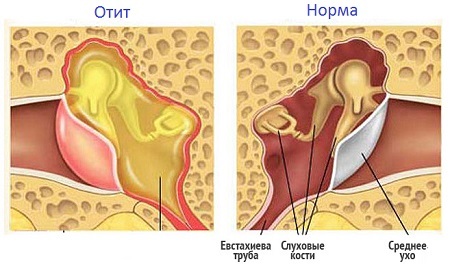- Why does the intestine hurt?
- Diseases that cause pain
- Related videos
Patients with bowel pain often complain of pain in the intestines. There can be a lot of reasons for this condition, but most often the appearance of this symptom provokes inflammatory and infectious processes in the intestine.
Patients describe their discomfort differently. Pain can be acute, dull, aching. The nature of soreness differs depending on the underlying pathology and the severity of its course. Pain is the signal of our body about the presence of some kind of disturbance in the body.
And it is important to understand that the pain in the intestine on the left does not always signal about intestinal pathologies. Sometimes for a harmless, at first glance, symptom may be vascular diseases, disorders of the urinary system, chest organs, and others.
If you have discomfort on the left side - this is a serious reason to contact a specialist. Self-diagnosis can seriously damage your health. Recognize the ailment is capable of a qualified specialist who possesses the necessary knowledge base, necessary for conducting a comparative analysis of various pathologies. Unskilled actions can even lead to death.
Why does the intestine hurt?
On the left side of the abdomen are vital organs: ovaries, spleen, pancreas, intestines, part of the stomach. The appearance of pain provokes a spasm, affecting the nerve endings.
Consider a list of common causes of bowel pain in the left lower abdomen:
- is an inflammatory process that can cause an infectious process or toxic substances;
- autoimmune processes. This includes ulcerative colitis and Crohn's disease;
- dysbiosis;
- helminthic invasion;
- cancer;
- thrombosis;
- intestinal obstruction;
- intestinal atony or weak peristalsis;
- injury;
- peritonitis.

The gut may be ill on the left in pregnant women due to the growing uterus
Diseases that cause pain
Depending on the underlying ailment, the pain differs in character, duration and duration. A detailed description of the patient's pain allows you to suspect the presence of a particular pathology.
Parasites
Intestines are a favorite place for parasites. Ascariasis is a disease of dirty hands. Ascarid eggs enter the body through the soil. The main carriers of toxocars are cats and dogs. Pinworms lay their eggs in the folds of the rectum.
If children scratch the area around the anus and do not wash their hands, then self-infection occurs. A wide ribbon can penetrate the body with poor thermal processing of fish. Lamblias fall through household items, dirty hands and toys.
The main cause of parasite infection is the failure to comply with personal hygiene rules. Depending on the type of helminthic invasion, the symptoms may differ. Even experienced specialists can not always make an accurate diagnosis.
Some complaints of patients can be suspected parasitic lesions. Worms cause changes in the digestive tract, namely: flatulence, constipation, which are replaced by diarrhea.
Patients may have pain in the muscles and joints. This is because parasites like to migrate through the body, causing myositis, arthritis and so on.
Allergic reactions are the "true companion" of parasitic diseases. The glistens irritate the walls of the intestine, which leads to the penetration of small particles of food into the circulatory system. Immunity perceives them as an alien object. In addition, parasites themselves are allergens to the body.

Parasites are a common cause for the intestines of the
Basically, helminths live in the thick and thin part of the intestine. This leads to exhaustion of the body and a shortage of nutrients. Parasites stick to the walls of the intestine, and live and reproduce due to the fact that they drink blood and tissue juices. It turns out that worms use those useful substances that must be absorbed by the body.
Parasites emit toxic substances that poison the body. This leads to the appearance of pain, damage to the internal organs, as well as the nervous system. Glistular invasion sometimes leads to intestinal obstruction. Parasites irritate the walls of the intestine and provoke a violation of digestion.
Constipation, diarrhea, flatulence - another symptom of helminthic invasion is another cause of soreness. Stool retention appears due to the fact that helminths overlap the lumen of the intestine as it grows, thereby interfering with the exit of stool.
The processes of vital activity of worms are the cause of too hard feces. Parasites interfere with the absorption of fatty acids. Fats, along with feces, leave the body in an unchanged form.
For pains in the intestine with helminthiasis are such features:
- diffuse nature of pain;
- bouts of pain;
- soreness can acquire a different character, from cuts to aching discomfort;
- soreness is aggravated by a stool disorder.
Crohn's disease
This is a chronic inflammation of the digestive tract. Crohn's disease is a rare autoimmune process. The disease can affect any part of the gastrointestinal tract from the oral cavity to the rectum.
The reasons for the development of pathology have not yet been fully explored. Specialists distinguish immunological, hereditary and infectious factor in the development of Crohn's disease. Doctors also talk about the role of lifestyle in the development of the disease. Bad ecology, smoking, alcoholism - all this theoretically can cause pathology.
Inflammatory process of the intestinal mucosa eventually leads to ulcerative lesion. This causes pain, diarrhea, and the appearance of blood and mucus in the stool. The pain intensifies during the act of defecation.
The disease leads to a violation of the general condition, including an increase in temperature. Pathology proceeds over a long period of time. Often the periods of remission are replaced by exacerbations.
During an exacerbation of the disease, it is important for the patient to provide complete physical and mental rest. Medicamental therapy may include anti-inflammatory, hormonal, antibacterial agents and others. Patients are required to diet. In severe cases, surgery may be necessary.

Crohn's disease causes severe pain
Intestinal atony
The smooth musculature of the intestine has a contractile capacity, due to which the fecal masses move from the upper sections to the lower ones. Loss of muscle tone and causes intestinal atony. Muscles can be either spasmodic, or, conversely, too relaxed. There is a pathological process in the form of constipation or difficulty in the stool.
Atonia threatens the development of chronic constipation, and in severe cases is fraught with intestinal obstruction. Dysfunction can develop as a separate disease or be a manifestation of another pathology. Cope with pathologies is possible only after the elimination of the root cause. What are the causes of atony of the intestine?
The disease can cause a number of reasons:
- improper nutrition;
- structure anomalies;
- stress;
- radical diets or fasting;
- infectious processes;
- is a sedentary lifestyle;
- dysbiosis;
- helminthiosis;
- is a genetic factor.
Pain in the intestines is accompanied by flatulence, stool retardation, weight, lack of appetite. The general state of health is disturbed, the person has weakness, the body temperature rises. The skin of the face becomes pale, and the body acquires a marble shade. Atony leads to disruption of full sleep and anemia. Only an integrated approach will help cure atony. Doctors prescribe diet food, moderate exercise, and normalization of lifestyle.
Intestinal obstruction
The mechanism of development of pathology is associated with the cessation of the natural physiological passage of the food lump in the gastrointestinal tract. The pathological process is complete or partial. For example, the presence of neoplasm can cause partial obstruction due to the narrowing of the diameter of the intestine. Only a small amount of food can pass through the hole.

Intestinal obstruction is a dangerous state of
Specialists identify a large number of provoking factors in the occurrence of an ailment:
- bruise, bruise, foreign body, worms - all this can cause reflex spasm;
- discirculatory disorders occur due to embolism, thrombosis, vasculitis;
- craniocerebral trauma, psychological disorders, ischemic stroke can cause damage to the nervous system;
- surgery;
- intoxication;
- hernia;
- adhesive processes;
- overeating after prolonged fasting;
- transition to artificial feeding.
The disease causes cramping pain, stool retention, bloating, indomitable vomiting. Stihanie pain in intestinal obstruction is not a sign of recovery, on the contrary, it is an alarm signal, indicating the development of peritonitis or death of nerve endings.
Conservative therapy of atony includes the use of analgesics, the fight against intoxication of the body, as well as violations of homeostasis. Patients are given siphon enemas, and a gastric tube is injected. If the medication is ineffective, surgical intervention is performed.
Sigmoiditis
Sigmoiditis is a disease in which the sigmoid colon becomes inflamed. The task of this department of the large intestine is the final formation of feces that can irritate the mucous membrane of the organ.
As a result, there may be microdamages, which create the prerequisites for the appearance of an inflammatory reaction. In addition, the curved shape of the sigmoid colon delays the passage of the food lump, which increases the irritation of the calves.

Anatomical structure of the sigmoid colon contributes to the emergence of the inflammatory process
In addition, intestinal infections, dysbiosis, radiation sickness, circulatory disorders, ulcerative ulcers can cause sigmoiditis. The pain syndrome in the disease is aggravated by changes in the nature and frequency of the stool, as well as a violation of the general condition. The pain in the left side of the abdomen is so intense that it gives to the left leg and lumbar region.
Treatment directly depends on the provoking factor. If sigmoiditis was caused by intestinal infections, then antibacterial therapy is prescribed. If the whole thing is in nonspecific inflammatory bowel diseases, anti-inflammatory drugs will be needed. To cope with symptoms of intoxication helps infusion therapy.
With competent and timely treatment in most cases, you can achieve full recovery. It is important to understand that the treatment process is quite lengthy and implies compliance with dietary nutrition.
Colitis
Colitis is an inflammation of the large intestine. The disease causes all sorts of reasons: prolonged antibiotic therapy, infections, malnutrition, parasites, poisoning. Dysbacteriosis, burdened heredity, overstrain of physical and mental plan.

Colitis in the stomach can cause
Acute colitis can be caused by staphylococci, streptococci, salmonella, dysenteric microorganisms. There is an acute process in the form of pain in the abdomen, diarrhea, bloating, as well as the appearance in the stool of blood and mucus.
In chronic course soreness acquires a cramping character, diarrhea alternates with constipation, weakness and loss of appetite appear. Regardless of the cause of colitis, patients are prescribed a diet. Along with medical therapy, you may need physiotherapy, psychotherapy, and also sanatorium treatment.
Pain in the intestines on the left side is an unpleasant symptom that can signal the presence of disorders in the body. The appearance of discomfort in the left side of the abdomen can be atony, intestinal obstruction, inflammatory processes, helminthic invasions and others.
A qualified specialist will be able to diagnose and diagnose provoking causes after the examination. Self-medication can end tragically, up to a lethal outcome.



